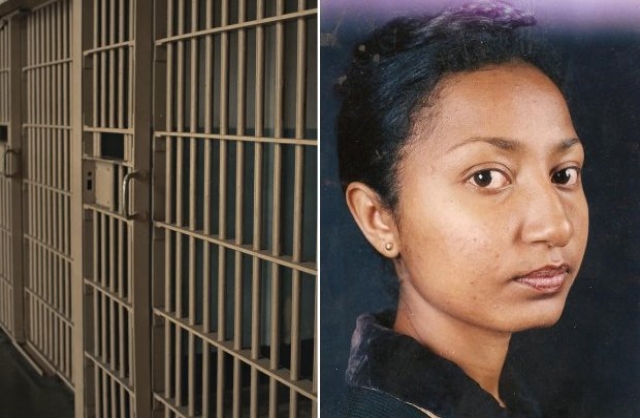 Imprisoned Ethiopian journalist Reeyot Alemu, recipient of the 2012 Courage in Journalism Award and winner of the 2013 UNESCO World Press Freedom Prize. (Photo: Getty Images)
Imprisoned Ethiopian journalist Reeyot Alemu, recipient of the 2012 Courage in Journalism Award and winner of the 2013 UNESCO World Press Freedom Prize. (Photo: Getty Images)
Tadias Magazine
By Dagnachew Teklu

Updated: Friday, July 19, 2013
Washington, D.C. (TADIAS)- A delegation of the European Parliament’s Subcommittee on Human Rights conducted a visit to Addis Ababa this week to meet with AU and Ethiopian officials and to assess the human rights situation in Ethiopia. The EU parliamentary delegation was led by Barbara Lochbihler of Germany and included Jacek Protasiewicz of Poland, Jörg Leichtfried of Austria, and Jean-Jacob of France.
The group was turned away from Kaliti prison, where most of Ethiopia’s prominent imprisoned journalists and political leaders are held.
Reached by phone the head of the EU delegation, Barbara Lochbihler, said officials at the prison administration asked the delegation to leave the area without giving them any explanation. She said they had received permission in advance through the EU delegation in Ethiopia to visit the Kality prison facility. She said the meeting was scheduled from 8:00 am to 9:00 am on Wednesday morning.
“However, when we arrived there, we were denied access,” Barbara said. She noted that the delegation had a similar visit earlier this year to Yemen without such an incident. “We are protesting this action,” she said. “It is honestly disappointing.”
Barbara indicated that the delegation was scheduled to visit journalists Reyout Alemu, Eskinder Nega, Woubishet Taye and other imprisoned opposition party officials.
“The Government of Ethiopia must guarantee freedom of opinion, speech and the right of peaceful assembly at all times, in accordance with its Constitution and obligations under international law,” the European Union said in a statement.
In an interview with the Associated Press Getachew Reda, a spokesman for Prime Minister Hailemariam Desalegn, said Ethiopia has no political prisoners. “We do have, like any other country, people who were convicted of crimes including terrorism who are currently serving their sentence,” he said. “We are not going to release anyone just because some European Union members said so.”
Getachew dismissed the EU appeal saying: “They [the prisoners] would only be freed when either they complete their sentence or probation on good behavior.”
Regarding their visit to the AU headquarter, a priority issue for the EU delegation was the fight against impunity. In this respect, Ms. Lochbihler declared, “Africa has played a pivotal role in the establishment of the International Criminal Court (ICC). Cooperation among international, regional and national levels is crucial to promote global justice and peace. We owe to the African victims of atrocious war crimes that those responsible are brought to justice.”
As to Ethiopia, the visitors took note of some “encouraging developments,” such as the adoption of the National Human Rights Action Plan and the establishment of the Human Rights Commission and of the Ombudsperson.
“While welcoming the efforts of the Ethiopian authorities in the field of economic and social rights, notably in relation to poverty alleviation, the EP delegation called for the opening of the domestic space for civil society, which could only contribute to the overall development of the country,” EU said in a statement. “They stressed that civil society organizations should be allowed to function freely, without interference, harassment and undue restrictions.”
The European delegation’s visit to Addis included meetings with representatives of the government, parliament, opposition parties, as well as with representatives of civil society organizations.
Meanwhile, former President of Ethiopia and UDJ Chairman Negasso Gidada has told international media that police in four districts of Addis Ababa had detained 40 opposition supporters on Tuesday for distributing pamphlets asking people to sign a petition that also demanded the release of jailed opposition members, religious leaders and journalists. “It is harassment,” Negasso said in a phone interview with Bloomberg News. “There is no law that says you need permission to distribute leaflets.”
—-
Related:
Letter From Ethiopia’s Gulag: By Eskinder Nega (The New York Times)
EU urges Ethiopia to release journalists, revise terror law (Reuters)
Police Detain UDJ Activists Calling for Terror Law Repeal (Bloomberg News)
Ethiopian Opposition Holds Rare Protests in Gondar and Dessie (AFP)
Join the conversation on Twitter and Facebook

























